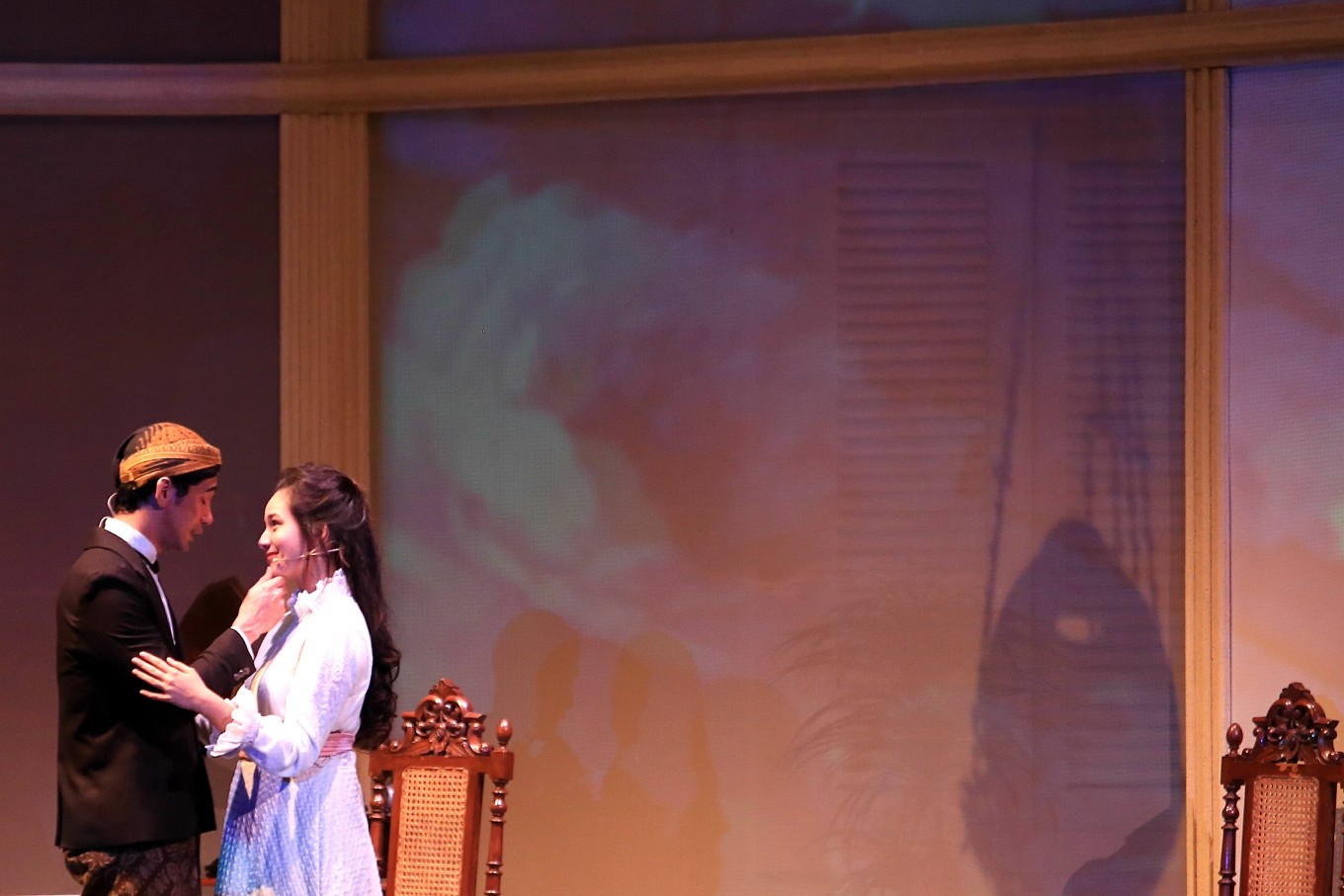Popular Reads
Top Results
Can't find what you're looking for?
View all search resultsPopular Reads
Top Results
Can't find what you're looking for?
View all search resultsBunga Penutup Abad: Finding Pramoedya's words on stage
Change text size
Gift Premium Articles
to Anyone
Bunga Penutup Abad (The Flower that Ends a Century) exposes Pramoedya’s beautiful words in the face of tragedy and adversity.
Anguish pervades Pramoedya Ananta Toer’s work like a fly you can’t swat. A son is executed for the killing of a corporal, leaving his mother deranged and in constant mourning. A man has a target on his back.
The lives on Pramoedya’s pages can be cheap, but they also evoke resilience, a passionate desire to be free. No human resolve in his books comes from just thinking about it one day — circumstances often force them to keep their guard up.
These pages might also be a reflection of their maker. It was always uncertain where Pramoedya would end up next or sometimes until when. He had had his belongings taken, along with the years he could have spent caring for his children.
In his early adulthood, he had known too many prison cells for a guy his age. In the case of his most celebrated tetralogy, the Buru Quartet (from This Earth of Mankind to The House of Glass), he conceived the sprawling tale as a political prisoner. Authorities failed him; he knew anguish by heart.
Read also: ‘Bumi Manusia’ movie stills unveiled
As the crescendo rings inside Teater Jakarta at the Taman Ismail Marzuki complex, the play Bunga Penutup Abad — based on Buru Quartet’s first two books — communicates anguish so starkly. Nyai Ontosoroh (Marsha Timothy) sits upright, while her son-in-law Minke (Reza Rahadian) hunches a little.
They read the letter sent by Minke’s friend, Panji Darman, who is with Annelies, Nyai’s daughter, who has just left for the Netherlands.
This is the third iteration of Bunga Penutup Abad, all of which were directed by Wawan Sofwan. It was first staged in 2016, with Happy Salma (who serves as producer) as Nyai Ontosoroh; Reza, Chelsea Islan’s Annelies; Lukman Sardi’s Jean Marais and Sabia Arifin’s May Marais. Marsha now assumes the role of Nyai.
Staging Pramoedya’s books was indeed a marvel. But Bunga Penutup Abadexcels as at building a narrative structure.
Delving into the theme of identity (what makes one pribumi, Indo or white?), the play is framed by the series of letters that Panji sends, notifying Minke and Nyai Ontosoroh about Annelies who refuses food and defecates in her bed, paralyzed by fear and resignation.
If you were to dismantle any form of commentary in Pramoedya’s books, then you would also perhaps find tragedy looming over his characters. Bunga Penutup Abad knows this very well.
Read also: Why literature needs more minority authors
Told through monologues and flashbacks, the laundry list of misfortunes and ordeals that befall these characters are not for the faint-hearted: Herman Mellema, Annelies’ father, dies in a whorehouse. Nyai, born Sanikem, was a concubine during her childhood, sold by an inconsiderate father and a feeble mother. “I was sold to a white giant with the skin of a lizard,” she says.
She had turned her misfortunes around, overseeing a company that has become so big that the “white Europeans want to take it away” from her.
Nyai Ontosoroh provides Bunga Penutup Abad with the play’s heart: she recounts her tragic past to Annelies, never losing her composure. Pain, however, still lingers and manifests itself in deep distrust. “Only their skin is white,” she says of the Dutch settlers. Let the mother handle the pain, the daughter should rest easy.
Bunga Penutup Abad spends its time exploring its characters in the time of adversity. Minke, from a
lowly boy to a respected writer, assumes the role of a dutiful son-in-law and a romantic lover. He is also in conflict with himself.
During an argument with his friend, Jean Marais, he argues about his insistence on writing in Dutch — the people who would read his writings won’t. His European education won’t permit the gross act of reaching across the aisle. Jean, of course, isn’t having it, berating Minke for his pretentiousness.
All of the actors in this play — there are only five of them — are uniformly excellent. Reza’s punctuating his awkwardness when meeting Chelsea’s Annelies for the first time (‘Her smile could make your faith collapse,’ he says) by speed-talking incoherently is an example of sublime acting. Marsha’s unbridled rage that transitions into hardened composure is testament to her versatile acting.
But the saddest fate befalls Annelies. Chelsea is more than able to capture her desolation. Bunga Penutup Abad juxtaposes her cheerful, innocent past (she is taken out of school by her mother and works for her ever since, depriving her of friendships and childhood) with her unseemly present. Wonokromo, Nyai and Annelies’ residence has seen too many hardships, like the country that holds it steady.
And everything goes back to the words of Pramoedya Ananta Toer. He is still a puzzling, incredible figure.
Bunga Penutup Abad is more than a tribute, but it does coast on your knowledge of Pramoedya’s books. What it also does is remind you that it has been 12 years since the writer died. But, as Nyai Ontosoroh tells her son-in-law, his words won’t “go out with the wind”.











